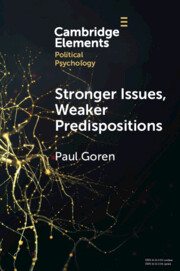Element contents
Stronger Issues, Weaker Predispositions
Published online by Cambridge University Press: 09 December 2024
Summary
- Type
- Element
- Information
- Series: Elements in Political PsychologyOnline ISBN: 9781009529303Publisher: Cambridge University PressPrint publication: 16 January 2025

